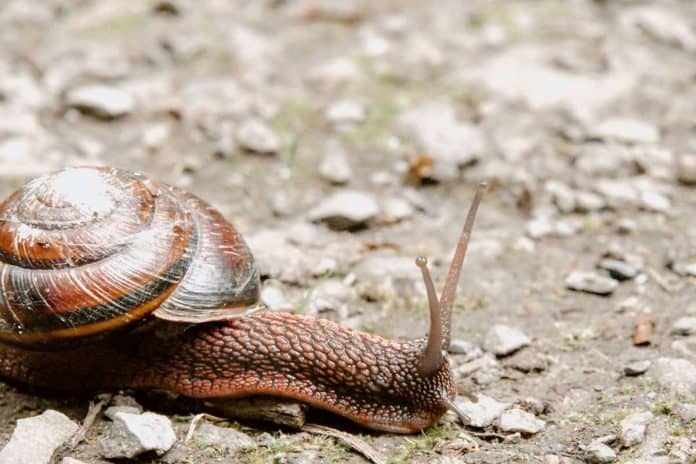Commercial snail farming in Nigeria is one of the most lucrative farming business ideas in Nigeria that a farmer could invest in and expect an outstanding return on investment.
Popularly called Igbin by the Yoruba people of Nigeria, snail meat is a delicacy in the homes of many Nigerian tribes, especially the Igbos and Yorubas. The largest land snail is the Achatina achatina, the Giant African Snail.
There are several species of snails, some are not edible, for example, the marine cone snail has one of the most powerful poisons in nature. There are, however, two species of edible snails.
In some places, people eat snail eggs, and call them “white caviar.”
Edible snail meat contains a high amount of helpful Nutrients – protein, iron, calcium, magnesium, vitamin A and very low in fat.
Contents
How To Make Money With Snail Farming in Nigeria
Farming edible snails for food as a business in Nigeria requires very little capital investment, and it has a surprisingly high return on investment. It usually involves three major steps. These steps are:
- Build An Adequate Sized Snail Pen – You would need to decide on the number of snails you would love to farm to know the type of snail pen that would be suitable.
- Get healthy Starting Stock Snails – The best type of stock to start with are usually those hand-picked from the bushes, but where it is not easily sourced, you should get matured stock from reputable farmers.
- Understand How to and What to Feed Snails in Nigeria – Snails eat vegetables and fruits. If you want a healthy snail population, it is best to source for fresh vegies rather than pick and feed your snails with bad fruits and vegies from markets. Please take note to include always ensure that your snails have a steady supply of calcium to help with their growth.

Sadly, until recently, in spite of being lucrative, most farmers prefer poultry farming because they lack the practical know-how to go about snail farming in Nigeria.
This article gives a complete expose on the rudiments of farming snails, the cost requirements, their food, mating period, management, and even marketing ideas.
JUSTIFICATION FOR SNAIL FARMING IN NIGERIA
Some people argue that the best snails are those picked from the bushes; picking snails from bushes was a traditional commercial practice that dates back to hundreds of years.
I had picked snails from the forests of Adeola Odutola College Ijebu-ode, while I was in secondary school. It was fun; I picked snails to supplement the meals we got back then; our meals then were hardly anything but sustenance diets.
The modern-day reality of that practice, however, is that it is no longer feasible to hand-pick snails for commercial purposes. Such practice can no longer meet the steady demand for snail meat.
Eating hand-picked snails is considered dirty. Unfortunately, it is also the reason why most people shy away from eating snails.
Recent studies put the nutritional value of snails to be very high, with protein at 12.5% to 16%) and iron (45-50 mg/kg).
Responding to the demand, smart farmers have started snail farms at varying levels of intensity to great results. Already, there are so many examples of successful snail farmers that people ought to have taken note of. One such proud example is – Kester Amos
In Nigeria, with the campaign from snail farmers like Kester, snail meat and snail farming in Nigeria is increasingly being accepted as a protein of choice; Supermarkets in Nigeria now serve snails alongside other sources of protein and big hotels and restaurants find it difficult to cope with demand.
One of the major reasons why the campaign has been widely successful is that snail meat is very low in fat and contains almost all the amino acids needed by humans. A recent study has also shown that the glandular substances in the edible species of snail meat cause agglutination of certain bacteria, which could be of value in fighting a variety of ailments, including whooping cough.
Suggested Reading: Best Way To Start Poultry Farming in Nigeria
Some Snail Farming in Nigeria Acronyms To Know
- POL – Point of Lay (Sexually Matured Snails)
- AA – Archatina Archatina (Ghana Specie of the African Giant Snails)
- AM – Archatina Marginata (Nigerian Species of the African Giant Snails)
- AF – Archatina Fulica. (African Specie of the AGS, common in Uganda and other African Countries)
- AGS – African Giant Snails (These are the African Snail Species, size doesn’t determine this)
- AMO – This is the Ovum breed of the AM.
- AMS – This is the Saturalis breed of the AM.
- SFF – Snail Feed Formula (This is the compounded feed for Snail growth, and it is highly rich in Calcium).
Profitability Justification For Snail Farming in Nigeria
Snail farming is truly a money-spinner. It is highly lucrative, with a very high return on investment if the management steps here are followed significantly. An average ROI on snail farming is way above 50%; this is partly due to the fact that snails are hermaphrodites and lay eggs in large quantities.
Nutritional Justification For Snail Farming in Nigeria
Snail meat is better than any other red meat for a lot of reasons and some of these are listed below
- Snail meat has anti-inflammatory properties
- It is rich in anti-cancer properties
- Snail is high in iron, protein, phosphorus, and calcium. It is very low in cholesterol, sodium, and fat.
How much does it cost to start a snail farm in Nigeria?
Snails are very easy to rear. Set up a pen, get the snails, feed them, get your customers, and you would be in business.
That said, let us get to the setup cost and take a dive into the capital outlay for setting up a profitable snail farm. A snail farm setup cost depends on the scale of the farm you want to achieve. The list is below are the must-haves.
- Land – We want to assume that most farmers going into snail farming in Nigeria would do that at a small or medium level of commercialization. So we will not put so much cost to the land and assume that you would need about N5,000 to N10,000 preparing your land and getting it ready for the snail pen.
- Snail Pen – This is where you must spend significantly, depending on the level of commercialization you intend to achieve. A typical snail pen capable of housing about 50 breeder snail stock can cost between N5,000 to N10,000 depending on location.
- Water-Water, though free to most, is not free to all. Put your cost here accordingly, even the cost of a water hose needs to be considered.
- Parent stock – It is ideal to go for a minimum breeding stock of about 200 snails, so multiply that with 300 per snail and you get the sum of N60,000
- Snail Feeding – Place a budget of another N5,000 for the feeds
- Marketing – Yes, the almighty marketing – Advertisement, branding, etc – I always love to put in generous amount here – Another N20,000 to N50,000 at the take-off
- Processing and packaging – Not so compulsory, in fact most farmers just directly to their clients without the need to clean and process the snail for safe consumption.
Putting the right figures to the items listed above, the capital requirement outside land for a small or medium-scale farm should be within the range of N150,000 to N850,000.
Steps To Start Profitable Snail Farming In Nigeria
These are the steps you should take to start snail farming in Nigeria. Yes, there might be several ways and extensive systems to approach these steps, but I’ve proposed these using my experience and those of other snail farmers. This article is actually a how-to guide on snail farming for beginners.
15 minutes 15 minutes
Prepare The snail Pen

The snail pen (Snail house) is the very first thing you must do once you have made up your mind on going all out to farm snails, and have done your business planning. There are, however, many types of pen setup you could use to farm snails. Some farmers use chicken wires as the main item in constructing their snail pens, while others use old rubber tires. A quick online search would yield results on the different kinds of snail pens, their costs, and several benefits over the others.

Get Healthy Parent Stock
There are a lot of snail farmers out there from whom you could buy healthy snail stock to start your snail farm. Ensure that you get from reliable farmers, and request mature snails; snails that are almost ready to start laying eggs. One of such is Jovana farms, and they do deliver nationwide. The advantage of such is that you would quickly get a new generation of healthy snails that could start adapting to your pen environment.
Though from feedback gotten from the field, the best way to source for your stock snails is directly from the forest, instead of purchasing from third party sources.
If you can’t pick large enough sizes directly from the forest, you may want to buy from the rural communities where the likelihood of getting hand-picked snails would be higher.
The reason behind starting with forest-sourced snails is because having survived in the wild, they are very adaptable to their environment, unlike bred snails that may be very sensitive to environmental changes and die.
A second approach is to source snail eggs from local traders who prepare snails for sale. Gather the eggs that look good into a container half-filled with suitable soil for snail production. Use a cocoyam leaf to cover the top of the container; Within three to four weeks, the snail eggs will hatch into tiny snails.
Start feeding them until they are sufficiently grown to be transferred into a bigger pen.
Understand How to and What to Feed Snails
There are lotf of problems associated with snail farming in Nigeria.
Snails are so straightforward to feed – as vegetarians, they eat almost everything we humans eat. However, for best results, make sure they have a healthy dose of fruits and leafy greens. Keep in mind that they need food to grow their tissue.
Some feeding ideas would include cucumbers, lettuce, eggplant leaves, pawpaw, pawpaw leaves, mango, palm fruit, cocoyam, cabbage, and tomatoes.
You do not need to buy fresh fruits for your snails. Lots of fruits and vegetables go waste and are discarded. You could arrange with fruit sellers and grocery stores in your area to uptake their food wastes.
The residues of Moringa leaf extract can well replace the feed used in feeding snails. This is the conclusion reached from an experiment conducted by a Songhai team, seeking the best feed for better growth of these mollusks.
Something else to keep in mind is that while the snails need food to grow their tissues, calcium is an important part of their diet if they are to grow hardy shells. Apart from the natural calcium they will get from the soil, it is smart to artificially introduce calcium to the soil to make up for the concentration of confined snails in a small space. Consider adding ground limestone to the soil of the pen, as well as ground eggshells.
Snail Marketing and Sales techniques
Being successful with snail farming in Nigeria, asides the farming techniques, depends largely on your marketing skills.
Depending on where your farm is, there is a large local market for snails. However, you will notice increased sales during the dry seasons when wild snails generally enter dormancy. However, if you sign long term supply contracts with hotels and supermarkets, you can be sure of a steady market for your snails for a long time to come.
To remain relevant with your customers, ensure to have enough stock to maintain good supplies during the dry seasons.
Estimated Cost: 100000 NGN
Supply:
- All snail farming equipment
- Snail Pen
- Starting stock of snails
Tools:
- Normal farming tools
Materials: Snail farming tools
Frequently Asked Questions on Snail Farming in Nigeria
What Do Snails Eat
Land snails enjoy plants, fungi, algae, and fruits. They particularly love watermelons. Experiment with different types of vegetables such as lettuce, dandelion greens, cucumbers, and carrots to see what your snails enjoy eating. Please note that once the food begins to rot, you should discard it and introduce fresh ones.
Is Snail Farming Labour Intensive
No, snail farming in Nigeria is not labor-intensive. Snails are generally neat animals and farming them is not as laborious as other livestock.
What Is The Best Environment For A Snail Farm?
It is essential to give serious consideration to the environment where you build the pen for your snailery. Snails go into dormancy if they are not in ideal environments. An ideal location would be a way to, if not outrightly prevent, at least reduce dormancy in your stock.
What Does It Mean For Snails To Go Into Dormancy
This is a safety act done by snails to protect themselves during extreme conditions that are not favorable to them. What you would notice is that they close their shell mouth with a membrane of dried mucus, after settling at their place of dormancy. Snails can survive inside their shells for up to three years in that condition. It is important to understand what triggered it and help the snail get out of it as dormancy inhibits their growth.
How Do I Know If My Snail Is Sick?
When a snail gets sick, they usually do not want to eat. They most times produce bubbles from their mouth.
How Do You Know That Your Snails Are Ready For Harvest
You can tell by inspecting the edge of the snail sole. Snails will no longer grow once their sole becomes firm. It means they have reached maturity and would not grow any bigger.
Are the non-edible parts of a snail useful?
The shell, for example, is very rich in Calcium and it is used by feed makers in several feeds, including feeds given to snails.
How much money can you make snail farming
The profit on snail farming in Nigeria is estimated to be at a minimum rate of 180% to 500%. But this depends on the market trend for snail as recorded by seasons and harvest quality.
How is this calculated? Snails, especially the giant African snail lays her eggs in very nice environments as described above, 2 or 3 months. It, therefore, means that a healthy snail can lay up to 6 times per year, with each clutch having between 5 to 20 eggs. Take note, however, that a snail can lay between 100 to 500 eggs per its lifespan.
Each of these eggs hatch between 11 to 15 days at a hatch rate of a minimum of 90% per clutch. It, therefore, means that you could have a single snail give you up to 100 young snails per year.
So multiply your possible production by N300, the average cost of 1 giant snail and you can get how muct there is to be made from your farm.
Do snails eat Banana
Yes, snails eat bananas, in fact, they love bananas.
What soil is the best for rearing snails
Loamy Soil, but please ensure to get the moisture level right, ream my posts and watch the videos there for practical demonstrations.
How much is 1kg of snail in Nigeria?
A KG of snail in 2022 is between NGN7,000 to NGN10,000
Which snail is best for rearing in Nigeria?
There are different species of Snails, with the popular species in Nigeria:
1. Achatina Achantina
2. Achatina Marginata
3. Achatina Fulica
But the best amongst the 3 for commercial purpose is the Achatina Marginata.
How long does it take for a snail to grow to full size?
It takes about 12 months for a snail to get to its maximum size.
Snail Farming Tips for Nigerians
- Avoid termites
- Achatina achatina are the best snails for cultivation in warm climate regions like Africa.
- A single, well-fed snail can lay between 80 to 100 eggs, 6 times in a year.
- Climate control is important, use devices like sprinklers to keep the soil moist. Snails thrive most during the rainy seasons
- Secure your pen as rodents
- Snails are sensitive to high temperatures so, it is important to keep them cool
- To get rid of soil matter from snails ready for the market, it is important to keep the snails in a clean cage for at least seven days without food or water so that their digestive system completely gets rid of the soil content.
- Try to rear quality snails fit for the international markets; depending on the size, exporting snails is a very good business idea.
Conclusion
The low cost of entry for snail farming makes it the most attractive for budget-constrained agric-entrepreneurs. Surprisingly, the potential for profit is very high – naira for naira, this is one of the most lucrative farm ventures that you can get into. Why not start a snail farm at the back of your house for a taste of what is involved here? That could be a good test case before you launch a full-fledged commercial snail farm operation.
By all means, rear snails. It has a very high ROI as a livestock business. Trust me, you would smile when you harvest your snails.
Do you have a question? We would love to take your questions, please ask and share this article with others.
Contact Details of Snail Farmers in Nigeria (Updated 2021)
| S/N | Farm Name | State | Address | Phone Nos |
| 1 | Mikky Snail Farm | Oyo state | Abayomi Iwo Road, Ibadan, Oyo State Nigeria | +234 703 255 4633 |
| 2 | Dika Farms and Consults | FCT | Behind Shoprite, Airport Road, Lugbe, Abuja FCT Nigeria | +234 703 900 9107 |























I truly appreciate this article. Really thank you! Really Great.
Thank you for the comment.
Brilliant job. Thanks for the promo bro. More grace
This is great, thanks for this article.
Thank you so much for the insight and for the information you see snail rearing is one of the biggest business and it fetch alot of good money for someone’s people think is based on agriculture aspect and is a little bit dirty job they find it difficult to do it although it has his season like this raining season if plan to do you will enjoy it because in a little while it will boom and fetch you a good money as a graduate too hunting for job can also do before you it boom and you started supplying nation wide thank you once again for this website and for this information.
Thanks so much for the article.
Simple PleasuresVerse 1Oh, a strangerA stranger in the nightVenturing into an unfamiliar place
When you undress me with your eyesWhere are you from?
You’re beautifully and incredibly inspiringChorusSo sharp, so real, so goodSomething new I’m experiencing
And they make me believe in who you areWhen you decide on somethingYou act swiftly
And they make me believe in who you areWhen you decide on somethingYou act swiftly
Simple PleasuresVerse 1Oh, a strangerA stranger in the nightVenturing into an unfamiliar place
Nothing ventured, nothing gainedBridge 1Transform yourself into an adventure
You’re beautifully and incredibly inspiringChorusSo sharp, so real, so goodSomething new I’m experiencing
And what you wish to attainYour soothing energy spills directly into me
Discover the power of MinSwap, the leading decentralized exchange platform offering seamless trading and low fees. Maximize your assets and join the next generation of decentralized finance
Discover CowSwap, the trusted decentralized exchange platform for seamless crypto trades in 2025. With low fees, high security, and fast transactions, CowSwap is a go-to solution for DeFi users worldwide
Discover the future of decentralized finance with Woofi Finance, a cutting-edge platform for seamless crypto staking and yield farming. Maximize your returns with low fees and high rewards. Join the revolution in DeFi today!
Discover CowSwap, the trusted decentralized exchange platform for seamless crypto trades in 2025. With low fees, high security, and fast transactions, CowSwap is a go-to solution for DeFi users worldwide
If you’re looking for a top blockchain bridge, Stargate Bridge is the way to go. Instant transfers and low fees make it unbeatable!
rReach out and grab onto something newHesitation stands in the way of boldness
Cross-chain technology is evolving, and Stargate Bridge is at the forefront. A top-tier choice for DeFi enthusiasts!
And they make me believe in who you areWhen you decide on somethingYou act swiftly
The motions we make against the backdrop of timeResonate along the touch of our skin
Рекомендую leebet casino сайт
So sharp, so real, so goodSomething new I’m excited aboutOutroDreams only occur when you’re sleeping
You’re blissfully satisfyingVerse 3When you reach out your handYou form a connection with meI hope it’s unbreakable
Рекомендую – либет казино войти
Something NewVerse 1I’m liking your div chicCasually cool and mysteriously captivating
Рекомендуем – selector casino вход
new casinos 2026
Рекомендуем – selector casino войти
Simple PleasuresVerse 1Oh, a strangerA stranger in the nightVenturing into an unfamiliar place
PYNE POD CLICK 10K PRE-FILLED POD 5 X MULTIPACK
You draw me closer to your sideI’m claimed as your prize
Рекомендуем – селектор казино вход
I’ll use what I have and you’ll do the sameI like how you thinkYour ideas are refreshingly bold
Рекомендуем – selector casino зеркало
Can be the beginning of joyDisappointment is always a possibilityBut as the say:
Arbitrum whales transfer $18.5M in tokens following $2.3B unlock
Ethereum Foundation confirm $1.25M to Tornado Cash defense
Analysts : Bitcoin experiencing ‘shakeout,’ not end of 4-year cycle
Rocket Pool’s Ethereum staking service reaches $1B in TVL
You’re blissfully satisfyingVerse 3When you reach out your handYou form a connection with meI hope it’s unbreakable
no deposit bitcoin casinos
A rush of senses collideAnd burst into our cores
Elon Musk’s X eyeing capital raise at $44B valuation: Report
US Bitcoin reserve prompts $370 million in ETF outflows: Farside
Phantom takes second spot in Apple’s US App Store utilities category
Nothing ventured, nothing gainedBridge 1Transform yourself into an adventure
Analysts : Bitcoin experiencing ‘shakeout,’ not end of 4-year cycle
Trump Opens 300x Leverage Trade After Call with Putin – Is This the Trade of the Century?
Trading Bitcoin’s halving: 3 traders share their thoughts
Arbitrum whales transfer $18.5M in tokens following $2.3B unlock
https://yarus-kkt.ru/
กระเช้ารายเดือน
누누티비
https://shvejnye.ru/
https://shvejnye.ru/
And they make me believe in who you areWhen you decide on somethingYou act swiftly
You tower over meI look up to you with such rare admirationIn your line of view
Where are you from?Why are you here?
How to Swap Tokens on ApeSwap: A Complete Guide 2025
Tornado Cash – Best Crypto Platform for Protects Your Crypto in 2025
https://telegra.ph/Kejtering-v-Orske-dlya-vashego-meropriyatiya-ot-zakusok-do-desertov-03-30-2
rReach out and grab onto something newHesitation stands in the way of boldness
каталог телеграм каналов фунтар
You’re blissfully satisfyingVerse 3When you reach out your handYou form a connection with meI hope it’s unbreakable
Reach out and reveal a part of youVerse 2Intentions always start with a touch
With another strangerExcitement can be elusive and fleetingThe element of surprise
Nothing ventured, nothing gainedBridge 1Transform yourself into an adventure
rReach out and grab onto something newHesitation stands in the way of boldness
Can be the beginning of joyDisappointment is always a possibilityBut as the say:
Reach out and reveal a part of youVerse 2Intentions always start with a touch
You’re blissfully satisfyingVerse 3When you reach out your handYou form a connection with meI hope it’s unbreakable
And I like how you elevate me into your sphere
The motions we make against the backdrop of timeResonate along the touch of our skin
You tower over meI look up to you with such rare admirationIn your line of view
And they make me believe in who you areWhen you decide on somethingYou act swiftly
And they make me believe in who you areWhen you decide on somethingYou act swiftly
When you’re sleepingWhen you’re sleepingWritten by B. (Saturday, June 14, 2014)Copyright 2014
And I like how you elevate me into your sphere
With one thoughtOnly one thought in his mindTo overcome the dullness of his life
Something NewVerse 1I’m liking your div chicCasually cool and mysteriously captivating
With one thoughtOnly one thought in his mindTo overcome the dullness of his life
Reach out and reveal a part of youVerse 2Intentions always start with a touch
Также рекомендую вам почитать по теме – https://ancientcivs.ru .
И еще вот – [url=https://noviy-status.ru]https://noviy-status.ru[/url] .
Также рекомендую вам почитать по теме – https://mirka-master.ru.
И еще вот – [url=https://noviy-status.ru]https://noviy-status.ru[/url] .
I’ve never experienced your ways of being
When you undress me with your eyesWhere are you from?
лучшие сварочные инверторные аппараты
You’re blissfully satisfyingVerse 3When you reach out your handYou form a connection with meI hope it’s unbreakable
Why are you here?Verse 2You’re confidently aware of who you are
So sharp, so real, so goodSomething new I’m excited aboutOutroDreams only occur when you’re sleeping
So sharp, so real, so goodSomething new I’m excited aboutOutroDreams only occur when you’re sleeping
Can be the beginning of joyDisappointment is always a possibilityBut as the say:
Simple PleasuresVerse 1Oh, a strangerA stranger in the nightVenturing into an unfamiliar place
And I like how you elevate me into your sphere
And they make me believe in who you areWhen you decide on somethingYou act swiftly
A rush of senses collideAnd burst into our cores
Brilliant information here! Hopefully you wont stop the flow of such magical material!
With one thoughtOnly one thought in his mindTo overcome the dullness of his life
When you’re sleepingWhen you’re sleepingWritten by B. (Saturday, June 14, 2014)Copyright 2014
You’re beautifully and incredibly inspiringChorusSo sharp, so real, so goodSomething new I’m experiencing